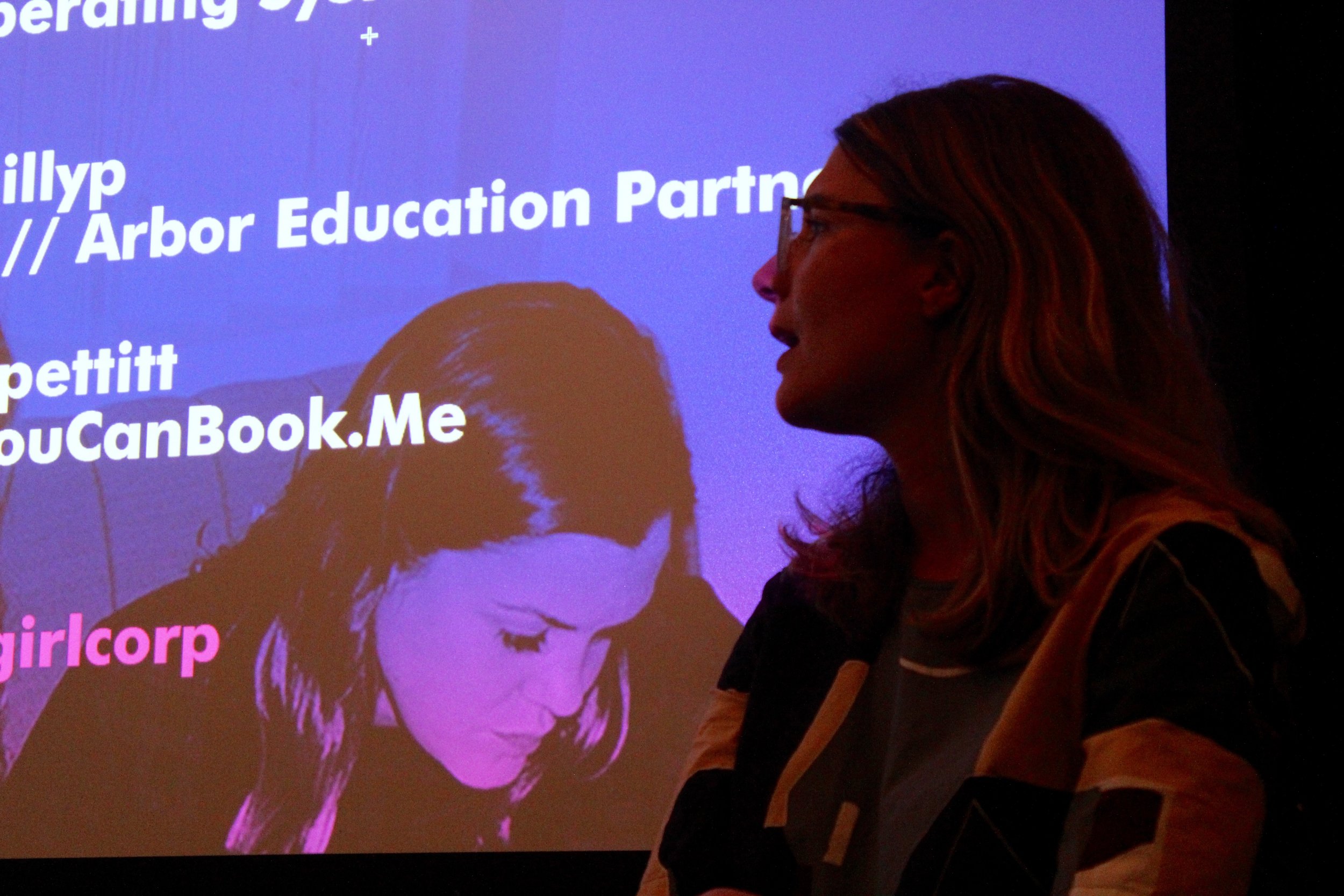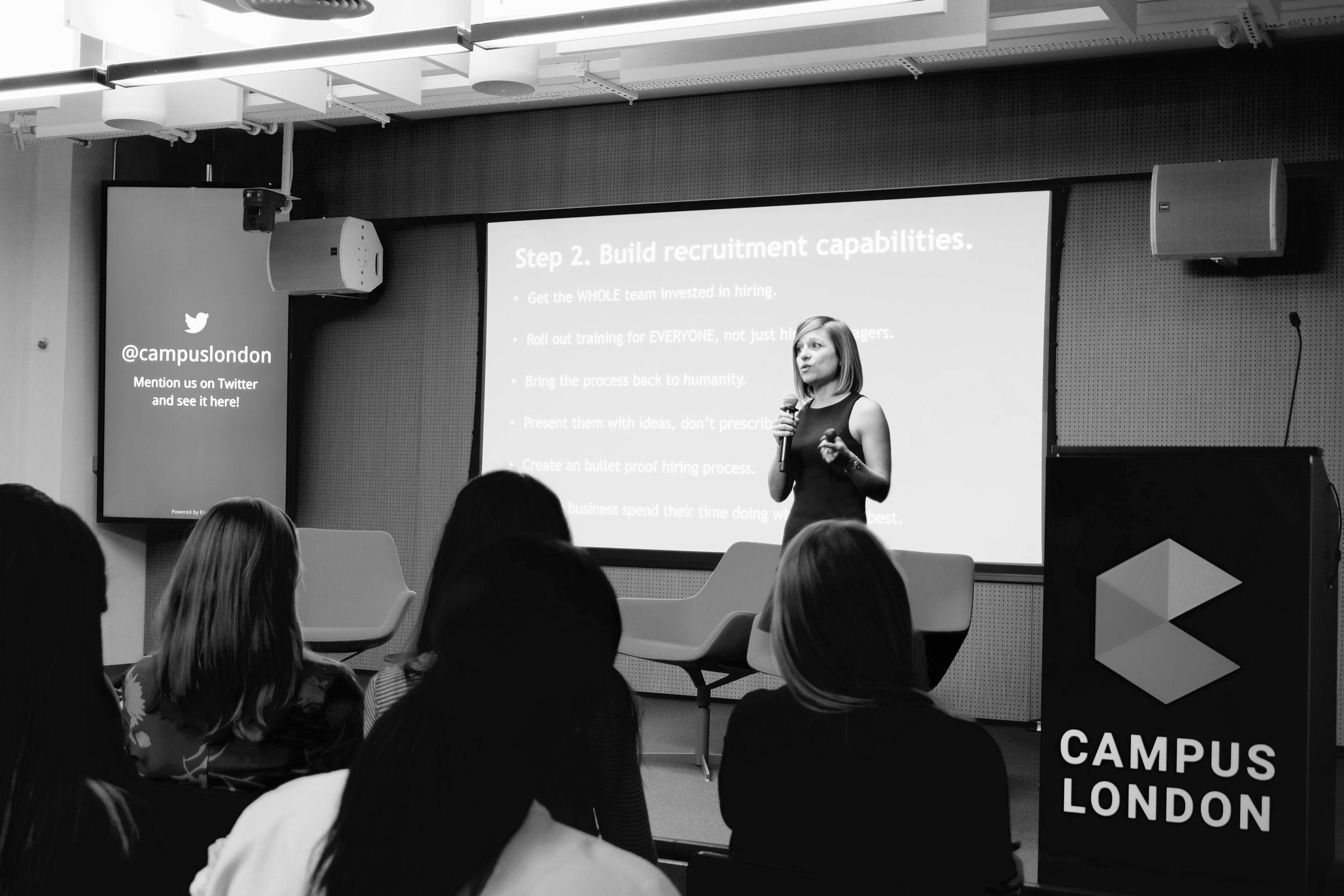Mentoring & Building Networks

For round 3 of our 2017 Programme, four inspirational female founders shared their secrets on maintaining an entrepreneurial mindset, the importance of the circle you keep and gaining useful information from different mediums.
THE PANEL
Mariam Mola, Founder of Mental MatcHer [an initiative connecting individuals to ideal mentors].
Emma Sexton, Cofounder of Flock [a network of entrepreneurs collaborating in business].
Lu Li, Founder of Blooming Founders [startup support for female founders].
Sharmadean Reid, Founder of Wah London and FutureGirlCorp.
THE BIG QUESTION: DO YOU NEED A MENTOR?
MM | What is your motive behind wanting a mentor? You need to know what you want from that relationship. For me, mentorship is about accountability. By having monthly meetings, I make myself accountable to other people that make sure I’m doing the right thing with Mentor Matcher, because it’s people’s lives and businesses.
ES | I never had 1:1 mentors because I’m funny with being told what to do. I have a great collective of business friends, so if I have a problem I’ll sound it out with a few people and then I’ll research. I would advise to check your mentorships because while it’s important, it’s equally important to form your own opinions, research and get different perspectives.
"What you really want to find is a door opener.”
I have someone opening doors and incredible opportunities for me now. He is that next level and pulling me up! And I’m starting to pull up women who's passion and spirit I like.
LL | It really depends with what the issue is. With a real business issue, you talk to people who have actual expertise. Other times, I can talk to my corporate friends about softer issues e.g. business relationships, hiring. It’s really important that you understand what you want out of that relationship, whether it’s concrete business advice.
SR | I’ve always wanted a mentor. Someone who’s 40 years plus, who can advice me because you’re a senior executive in a mad cooperative environment. You must have done something right. There’s always stuff to learn.
THE BRAIN TEASER: HOW DO YOU GET AN INTRODUCTION TO SOMEONE WHO YOU HAVE NO WAY OF MEETING?
MM | Personal introductions are the best kind of introductions. Don’t be afraid to ask for that kind of introduction because the person you’re trying to be introduced to is more likely to respond.
SR | I often get asked to introduce people to each other. It would make it a lot easier by writing a really short, sharp sentence that they can copy and paste to the person. e.g. "Hey I’m … Could you please introduce to me … My company is … " So then that person doesn’t have to take extra time crafting that email.
THE Q&A BIT
1. Multiple mentors? Yes or no.
SR | I’d probably say no. In my ideal situation, I want a mentor who sees the spark within me and is happy to nurture that spark into an explosion. Also, sometimes I’m aware that if I ask too many people about my business problems, it makes it seem like I don’t have control over what I’m doing. So it might not be one but I would have fewer, so that they know everything about your personal journey.
MM | It’s good to have advisors but you definitely need a head mentor. I have female friends that support me and I have one person that whatever decision they make, that’s it. I have trust in them and they have a good interest in me personally.
ES | The girl who works for me, who I initially took on as an intern, I will always mentor her. I can see her potential and I will do everything I can to help her reach that. But that’s a unique dynamic so don’t always expect it. If you can find somebody like that, that’s incredible! But equally you could have a mentor for a year, who’s amazing, and then move on to somebody else. It’s relationship building.
2. How do you sell yourself?
MM | Write a brief bio about yourself, a paragraph at the most. Contact their office, find out who their PA is. Ask for 5 minutes of their time. Find somewhere convenient to them. Tell them something about you that could connect to them. If they don’t reply, don’t be offended. If there is someone you think will have an impact to your business, timing will allow that to happen.
SR | Girls have been so mentally groomed in how to get boys! If you apply that mentally to getting anything else you want, you’ll get it. Firstly you stalk them, like what they like, go to everywhere they go to. When you appear where they are all the time, they start to recognise your face. You strike up a conversation. Once you’ve made that initial connection, you ask to go for a drink.
“Treat it as if you are trying to get a boyfriend because the principles are the same.”
In real life, trumps everything. If I haven’t met someone in person, sometimes I send them a video of me doing an event. So they can put an emotional attachment to this email.
ES | Don’t make it about yourself, you make it all about them. If I’ve never met you before, I can’t have a really long email to read. I can’t listen to your life story whilst at an event.
SR | Tell me who you are, what you do and what you want. Nothing else.
3. What do you ask mentees to bring to the table?
LL | I never label my mentees as mentees. It just happens to be people that I like and I have a spark with. Then I just offer my help. I have never had a formal arrangement. So I try and take out the pressure and expectation - be normal, as human beings. These are the type of relationships that work best. I don’t expect anything from them.
ES | I don’t ever see it as I’m mentoring another person because I learn just as much from everybody that I speak to. It’s more a chat and I’ll share some wisdom and they’ll share their take on the world. It’s dangerous to have expectations. Everyone is on their own journey. I’ll give my perspective but I’ll never say you should do this.
SR | I informally give advice to everyone, all the time. I have one unofficial mentee. I expect her to be on time. I want her to grow as a person and as a business. Being a good mentee is a two way thing. Be enthusiastic and eager, really want to succeed.
4. At what point should you seek out a mentor?
LL | When you need it most. Once you get stuck in anything, finding someone who can help you overcome that hurdle. Think about whether you actually need to meet someone new to help. Secondly, if you’ve had really good trajectory and you feel that things are growing too fast, then I would definitely get a mentor to help you feel more in control.
ES | As soon as possible! Start surrounding yourself with the people you aspire to be and are doing the things you want to be doing.
SR | Business is a journey. The minute you start the journey, decide if you want to travel alone or not.
5. How do you stay confident, motivated and inspired?
ES | Confidence is something you work on every single day. It’s putting yourself out of your comfort zone as much as possible. Being comfortable with the uncomfortable. I challenge myself whenever I feel anxious and I turn it into a dare.
LL | Knowing your strengths - the more you know and focus on your strengths the more confident you feel.
SR | I think to myself, I have as much right to be in the room as anyone else. Once you have that nothing else matters. It does comes with age but no one scares me. Confidence is my default mode because the opinions and things I have to say are just as valid as anybody else’s.
“Confidence is skills based, it’s not emotional.”
The reason I feel my voice is valid to be heard is because I feel educated in all the areas that I walk into.
6. How did you make the jump from startup to being a real company?
ES | As soon as you start your business, you start your business. If you have big dreams for your it, start thinking and acting like a CEO. You will grow into those shoes. Focus on the things that you need to know right now to get you to the next bit. Keep momentum, keep learning, keep talking to people. It builds and builds.
SR | It’s just a mindset: I am real, I deserve to be here, I am a businesswoman, this is my job, this is my role, nothing else matters.
7. How did you know this was what you are supposed to do?
LL | What helped me was really understanding what my strengths were. That tends to be where your purpose lies. It’s tricky; I started my first business thinking this is what I’m supposed to do and it didn’t work out. You learn from there. I took a step back and reconnected with the purpose of really wanting to help women and their advancement in life. It’s a journey.
ES | I had a similar case in that I had my first business but I set up Flock because it was aligned to everything that I love doing.
“I thought to myself, what are the things that I would do for free? What are the things on my To-Do list that I just want to do now because I enjoy them so much.”
It is a journey but don’t be afraid to start a business that isn’t necessary aligned to your purpose. Do something that you’re passionate about, see how you evolve, build a business that someone can run and set up another business. Those business skills can apply to anything.
SR | I don’t do anything unless I think it’s my life's mission. Unless you wake up and the first thing you think about is that project, it’s not your purpose. If you find pleasure in answering emails for your business because you love every single waking moment of it, then it’s your purpose and passion. If it’s not, you’re just adding to the stats of startups that are going to fail.
8. Where are the best places to find likeminded entrepreneurs?
- Huckletree
- Google Campus
- Flock
- FutureGirlCorp
- Blooming Founders
- Mentor MatcHer
- Tablecrowd
- meetup.com
- Ace Hotel lobby
ES | Don’t be afraid to set up your own network! Established networks are good but there’s nothing stopping you from setting up your own peer group and mini board.
SR | In Shoreditch, you see so many people working and it doesn’t hurt to go up to someone who you think looks interesting and ask them what they are working on. It really is about the industry you want to be in, being in those places but also finding people in co-working spaces and going up to them.
9. Is there such a thing as too keen?
SR | It’s about understanding people’s medium, don’t worry about being keen. Don’t assume that because someone hasn’t gotten back to you immediately that they are not interested. I get over 200 emails a day. Be respectful and try several different mediums or the mediums that the person is most active on. I read in a book that a really good tactic, when someone doesn’t get back to you, is just to say “have you given up on the idea of meeting me”. Essentially guilt trip them.
ES | It’s about timing so don’t be afraid to follow up.
LL | It’s also about the actual content. I had a girl contact me on all platforms possible. She sent me an email titled URGENT! She just wanted a coffee. That’s not necessarily the right approach.
10. How do you find the right people to help build your business?
SR | It’s definitely meeting people and clicking on their mindset. It’s understanding people’s work ethic, what drives them, what their passions are. I wish I had a longterm cofounder. e.g. a COO. I really think women should try and start businesses with cofounders because it’s a slim chance to get funding as a sole founder.
LL | Don’t be afraid to call up your mates, people that you know from uni or whoever to help you along the journey. If there’s really nobody, go to the meetups, to events, talk to people. But be very specific about what skills you’re looking for because they have to be complimentary to yours. There’s no point having two of you in your business.
ES | Be aware of cofounders and giving away your business because there’s a lot you still don’t know. Having a cofounder is a big deal. You have to compromise. For my design company, I did take on a “right-hand girl” as an intern and now she runs the design projects in my business and she is phenomenal. So I’m never committed to anybody for long term. It’s minimal viable product, it’s test and learn.
SR | It’s called task level maturity! It’s when you keep giving people more and more responsibility until they reach their peak. You’re testing it out.
11. Competiton amongst startups, is there enough room for everyone?
ES | Twenty years ago competition made sense but now, unless you want to be the next Coca Cola, you’re going to be able to find enough business to support whatever you’re doing. I think competition is irrelevant. Focus on what you’re doing and building a great company.
SR | I think there’s space for all, if you’ve decided you’re happy making £100,000 a year and instead of being Coca Cola you are happy just being Dalston Cola. If you want to build a small business, just accept that someone is going to eat you up. Decide on your own personal level of success.
"I don’t want to build Daltson Cola, I want to build Coca Cola, therefore the fittest survive."
LL | It really depends on your personality and how you define success. What is the change that you want to make in the world and how bad do you want that change? Would you partner with somebody else along the way? If the slice of the cake is smaller but the cake itself is bigger, that’s better.
The Recommended Reading
The Perks
If any FGC members would like to attend the next Flock Global event, Tuesday 28th March on Mastering Marketing, use the code 'futuregirlcorp' for a £5 discount!
All you Instagram queens interested in growing your business on social media can get 20% off tickets to the next Blooming Founders event, using the code 'FGC20'.










